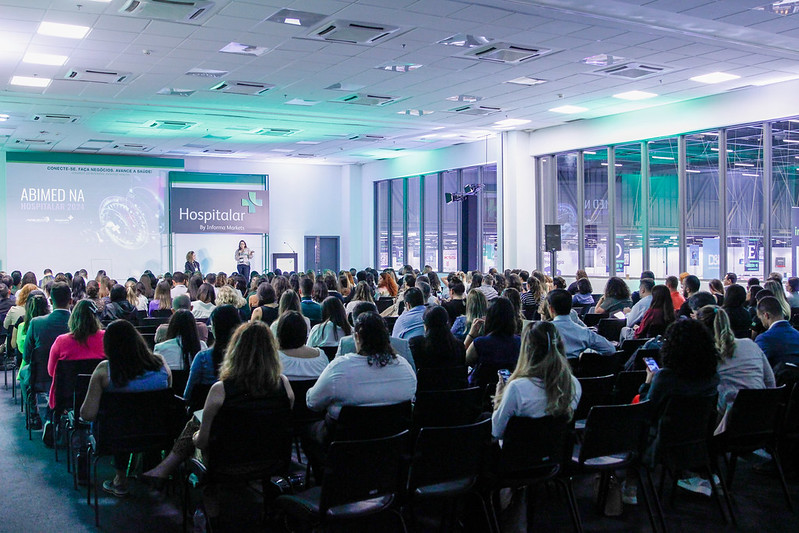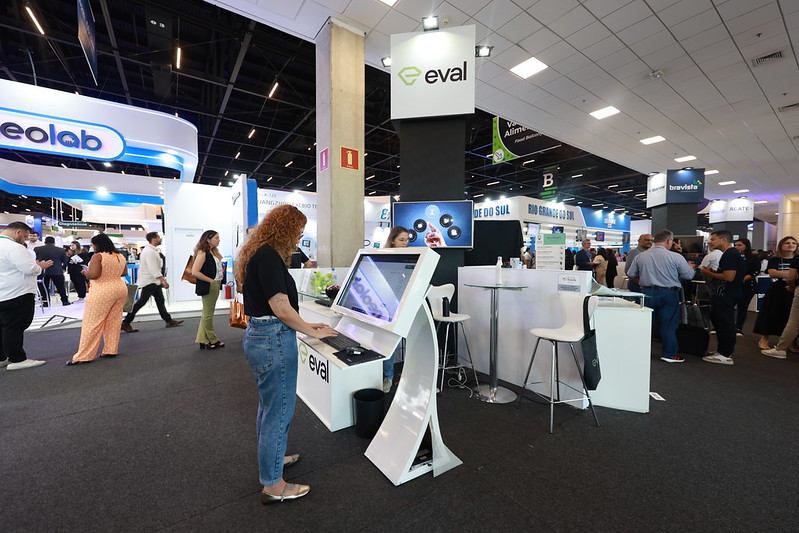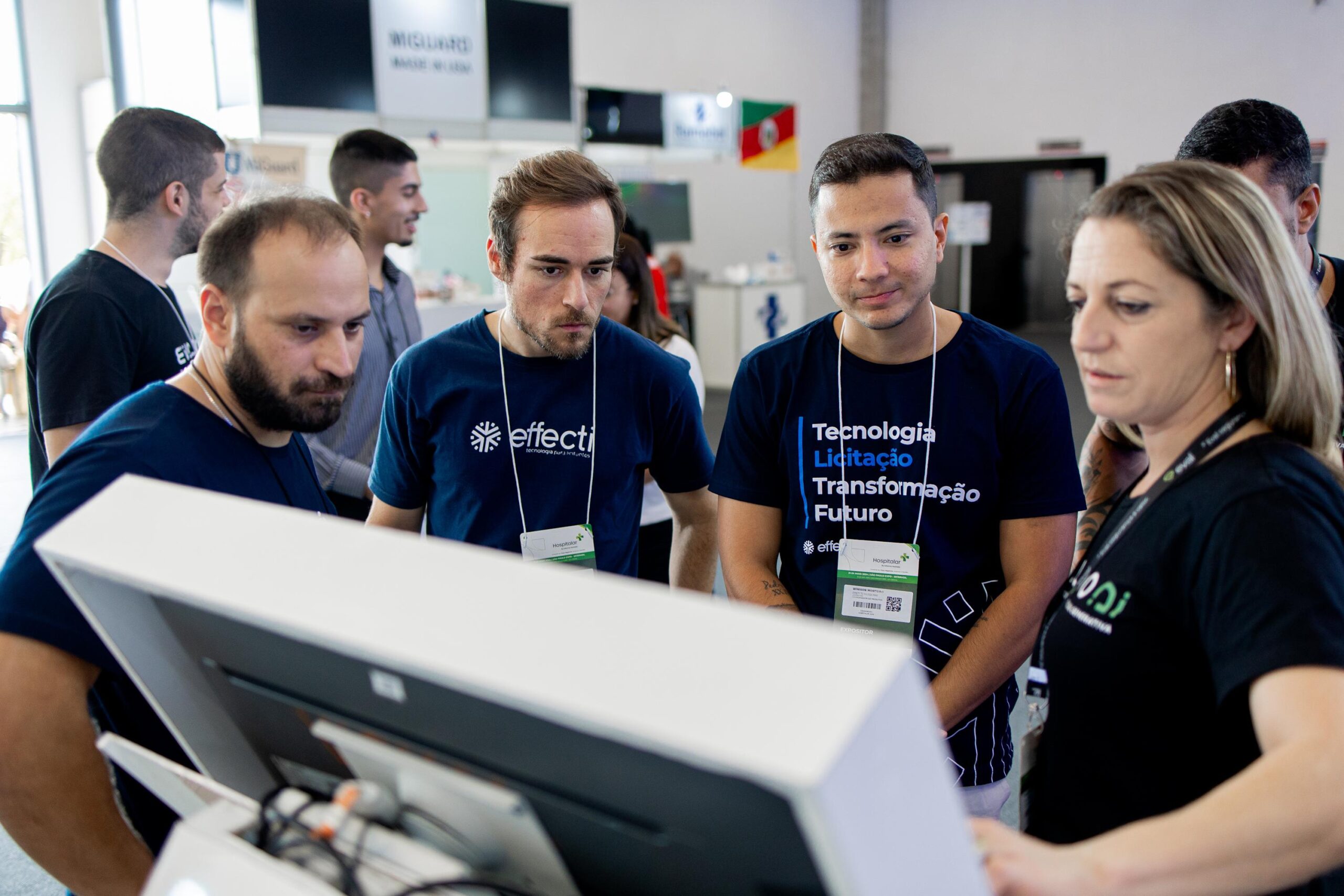A Hospital Fair 2024 took place from May 21 to 24, one of the largest events in Latin America and is already in its 29th edition. Eval Digital was present at the event on its stand, introducing visitors to the Evaldo.AI artificial intelligence solution.
The event brought together 1,200 companies from 30 countries to showcase their latest innovations in healthcare. In addition to the exhibitions, there were 30 parallel events, 5 of which were in-house events Hospital Fair and three content arenas, totaling 50 hours of content.
One of the major themes at the fair was the use of Artificial Intelligence in healthcare. Both exhibiting companies showing their solutions, such as Eval Digital, and the topics covered in the lectures.

Check out our summary of the main talks on the growing use of Artificial Intelligence in healthcare – a fascinating and topical subject whose integration into the sector is inevitable. Faced with this unavoidable reality, we can only embrace this trend.
It is now essential to develop customized AI solutions for the hospital sector, evaluate their effectiveness and be aware of the necessary precautions when using this technology.
We need to explore the extent to which we can trust the information generated by AI and, at the same time, guarantee the protection of the personal data that feeds these platforms.
Challenges and opportunities of using AI in the healthcare sector
Albert Einstein Hospital’s Head of Innovations at the Hospital Fair 2024, Rodrigo Demarch addressed the inevitable transformation that Artificial Intelligence (AI) is bringing about in the health sector. And he emphasizes that the adoption of this technology is a path of no return.
He highlighted measuring the effectiveness of AI as the main challenge, given the vast amount of data generated. He also pointed out the need to select data that truly proves the efficiency of the innovations implemented.
Demarch highlighted the use of AI throughout the hospital operational chain to support more accurate and informed decisions.
Another worrying topic mentioned in the lecture was the low uptake of Artificial Intelligence in Health in Brazil. This problem prevents deeper learning and valuable insights.
The issue of data vulnerability was also an important point of discussion, especially in the context of the General Data Protection Act (LGPD). The need to maintain interoperability that respects data privacy was discussed.
And what about the regulatory issues surrounding the use of AI?
Regulatory challenges in AI in Healthcare
One of the big questions raised in all the lectures on the subject of Artificial Intelligence at the Hospital Fairwhat would the regulatory initiatives be?
Hospital managers, doctors and health professionals who use AI or want to implement the technology say they are afraid and have many doubts about its use. In addition, they ask themselves, in the event of errors in a diagnosis or in the management and leakage of data, “who do we hold responsible”?
However, to everyone’s relief, a bill to regulate AI is already on the drawing board,
PL 2338/23
. According to Guilherme Forma Klafke, Project Leader at FGV’s Center for Teaching and Research in Innovation, the importance of the regulation is precisely to know who will be responsible in the event of damage to patients. It also guarantees the implementation of secure and reliable systems.
The researcher said that there is a categorization of risks that involves platform developers and users. In addition, the law requires institutions to create governance programs to adopt internal processes and policies of standards and good practices .
Evaldo.AI: Implementing AI in Hospital Management
In this context, the
Evaldo.AI
has emerged, a platform designed to specifically support the use of Artificial Intelligence in Healthcare. Created by
Eval Digital
the generative AI platform is perfectly adapted to hospital environments, automating processes and maximizing administrative efficiency without compromising the quality of patient care.
O
Evaldo.AI
deciphers large volumes of data, identifies patterns and suggests operational improvements, freeing managers to focus on strategic decisions.
Adopt the
Evaldo.AI
means transforming the way decisions are made in the hospital environment. Every administrative decision is supported by detailed analysis and recommended actions, ensuring that leaders can devote themselves to what is essential: patient care.
In addition
Eval Digital
with its expertise in AI and data protection, offers secure implementation of Artificial Intelligence in Healthcare, ensuring compliance with the GDPR and protecting sensitive information from leaks.
Therefore, for healthcare institutions looking for
innovation and safety in the use of AI
,
Evaldo.AI
from
Eval Digital
is the strategic choice that promises not only to accompany, but to define the future of the sector.
FDHIC Congress – The power of GenAIs in the healthcare ecosystem
The Future of Digital Health International Congress, which took place at the 29th Hospital Fair, had as its central theme“The power of GenAIs in the healthcare ecosystem”. Guilherme Hummel led the discussions, highlighting the impact of Generative Artificial Intelligences (GenAIs) on healthcare. Particularly in the patient journey, through smart applications and wearables.
The speakers, including renowned professionals such as Carlos Pedrotti (Medical Manager of the Telemedicine Center at Hospital Israelita Albert Einstein), Daniel Greca (Innovation and Business Unit Director at Hospital Sírio-Libanês) and Victor Gadelha (Head of Education, Research and Innovation at Dasa), discussed how GenAIs can make processes in healthcare institutions more organized and efficient.
Facing challenges such as a shortage of professionals and long waiting lines, GenAIs offer promises of greater integration of information and improved clinical documentation. Although, as Greca pointed out, they can’t solve all the problems by themselves.
In addition, discussions covered the ability of GenAIs to improve data classification and processing, essential for advances in clinical research and more accurate analysis.
The need for systemic change was also discussed, where the digitization of processes must be accompanied by real innovations that promote efficiency and disruption.
Participants speculated on the future of healthcare in 2034, envisioning more efficient institutions and more personalized and proactive care. As well as advances in clinical auditing and database management.
The dynamics of the congress present a promising path through the GenAIs, but also underline the importance of human responsibility in their implementation and management.
Hospitality and Facilities Congress at
Hospitality Fair 2024
At the Hospitality and Facilities Congress, Prof. Claudia Laselva, Director of the Morumbi Hospital Unit and of Care Practices at the Albert Einstein Brazilian Israelite Beneficent Society, discussed how the incorporation of technologies and artificial intelligence is transforming hospital management and enriching the patient experience.
During her talk “High Tech and High Touch” at the Hospital Fair, she highlighted initiatives such as the Operational Command Center and the Care Monitoring Center, which centralize operations and reduce costs and waste through efficient management of the flow of patients and resources.
The application of AI helps to prioritize beds and distribute staff rosters, improving efficiency and reducing waiting times and overtime. Technology is also present in other operational aspects, such as the introduction of robots for tasks such as admitting patients and transferring medication, and the automation of beds that allow patients to control their room environment via tablets.
Significantly, the hospital employs virtual nurses who use data from electronic medical records to predict and prevent clinical deterioration, thus reducing detection and intervention time.
Albert Einstein Hospital also prioritizes the humanized application of technology, ensuring that technological development allows healthcare professionals to devote more time to care that requires empathy and human interaction, reinforcing the positive patient experience.
International Congress of Health Services (CISS)
The International Congress of Health Services (CISS), during the 2024 Hospital Fair, was attended by the President of the Entre Douro e Vouga Hospital Center, Miguel Paiva, who shared insights on the applications of Generative Artificial Intelligence (AI) in health systems, focusing on Portugal’s experience.
Paiva highlighted activities such as writing, classification, translation and synthesis as the main capabilities of Generative AI, but emphasized the ethical challenges and technological dependence.
During his presentation, Paiva exposed both benefits and concerns regarding Generative AI in healthcare, including increases in productivity and efficiency, but also the dehumanization of the work process and problems related to data privacy and transparency.
Paiva also introduced five promising applications of AI in healthcare, which include AI-assisted diagnosis, personalized medicine, remote patient monitoring, clinical decision support and optimization of pre-operative workflows. All these applications use large volumes of data and sophisticated algorithms to improve the quality of care and make more precise and personalized interventions.
In addition, the importance of following ethical and compliance guidelines was mentioned, carefully considering patients’ rights and the responsible use of technology. Paiva stressed the need to balance AI’s predictive capabilities with the costs of potential errors, ensuring that the last decision is always made by a human.
HIS Stage discussed applications and impacts of AI and other technologies in healthcare
The space was set up in Plaza Hospitalar (street L-20), dedicated to promoting the HIS (Healthcare Innovation Show). The event will take place on September 18th and 19th.
Prof. Dr. Álvaro Machado Dias, neuroscientist and futurist at Unifesp, during his presentation on the HIS Stage at the Hospitalar 2024 Fair, highlighted the long history of Artificial Intelligence. It goes back to the language and machine learning models introduced in the 1950s.
He mentioned ELIZA, one of the first chatbots in 1966, which simulated dialogues with a psychologist, exemplifying the initial applications of AI, which included uses in health. Despite a period of decline in subsequent decades, Dias pointed out that we are witnessing a renaissance in AI, more in line with the current needs of the healthcare sector.
Metamodernity
Human uniqueness determined by cultural transmission and absorption of knowledge, highlighting that these attributes are now shared with machines through algorithms by AIs.
He introduced the concept of metamodernity, characterized by the sharing of the fundamental principle of cultural production and an exponential multiplication of information.
According to Dias, this new era holds promises such as creative autonomy and the ability to solve previously unsolvable problems.
However, challenges include technological stupidity and the algorithmization of thought, which can compromise human capacities. He reiterated that AI and related technologies are already being applied in health for monitoring, prediction and prevention, offering tangible benefits.
Álvaro Machado Dias, on the HIS Stage, also mediated a panel on AI and other technologies transforming healthcare. With the participation of Felipe Cabral (Moinhos de Vento Hospital), Francisco Neri (Santa Joana Group) and José Henrique Salvador (Mater Dei Network).
Cabral stressed the importance of the data governance established 10 years ago. According to him, this has put digital transformation at the heart of Hospital Moinhos’ business objectives.
Neri emphasized the creation of a digital education sector at Santa Joana to train professionals in new technologies. Salvador discussed the need for “open health” for interoperability between institutions.
The debate also touched on the responsibility of hospitals and healthcare institutions to educate their professionals on the effective use of Artificial Intelligence and other technological tools.

Evaldo. AI
Evaldo.AI is a Generative Artificial Intelligence Platform that turns efficiency and security into a competitive advantage for your company. As you can see from the Hospital Fair’s main insights into AI, this technology has arrived to build a new path in hospital efficiency and practice.
And as many speakers made clear, it’s a path of no return. By not adopting Artificial Intelligence to contribute to everyday life in the healthcare sector, many hospitals can fall behind in technological evolution and fail to improve the experience and health of their patients.
Unlock the Power of Generative AI and Take Your Business to the Next Level
Evaldo.AI offers companies not just a competitive advantage, but a safe and conscious operational change.
Check out the benefits:
Integrated with OpenAI API and Other Models
The evaldo.AI Platform integrates the transformative power of the main Generative AI models, such as OpenAI’s GPT, Google’s LaMDA and others.
Data Security and Privacy
Protect your sensitive data and comply with important regulatory requirements such as the LGPD, all with the security guarantee that only Eval offers.
Operational Efficiency
Eval’s Generative Artificial Intelligence Platform improves companies’ operational efficiency, optimizing internal processes for greater productivity.
Generative AI experts
Eval has a Generative AI implementation and training team so that business users can get the most out of the technology incorporated into their business.













